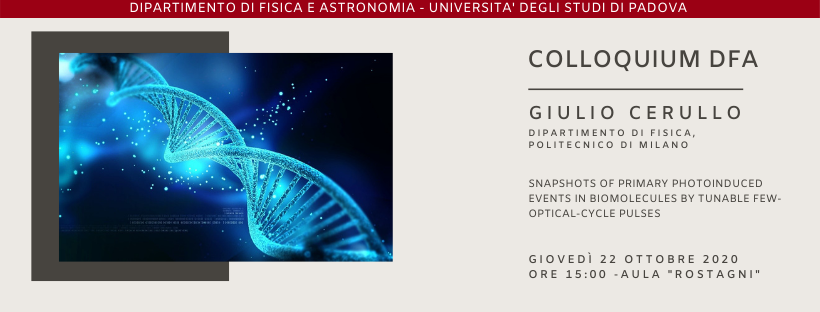Colloquium DFA - Giulio Cerullo
AULA ROSTAGNI
DIPARTIMENTO DI FISICA E ASTRONOMIA
 Snapshots of primary photoinduced events in biomolecules by tunable few-optical-cycle pulses
Snapshots of primary photoinduced events in biomolecules by tunable few-optical-cycle pulses
GIULIO CERULLO
Dipartimento di Fisica, Politecnico di Milano
Abstract
Many light-induced processes in biomolecules, such as energy relaxation, energy/charge transfer and conformational changes, occur on ultrafast timescales, ranging from 10-14 to 10-13 s. The speed of such elementary processes is intimately linked to their efficiency, making ultrafast optical spectroscopy an invaluable tool for their investigation [1]. Pump-probe and the emerging multidimensional spectroscopies require short pulses, in order to observe fast dynamics, and broad frequency tunability, to excite a system on resonance and probe optical transitions occurring at different frequencies. Optical parametric amplifiers are ideal tools for such experiments, because they provide frequency tunability and support broad gain bandwidths, enabling the generation of pulses with duration down to a few optical cycles and tunability from the IR to the UV [2].
In this talk I will introduce the principles of ultrafast optical spectroscopy and give examples of its application to the study of important photoinduced processes, such as energy/charge transfer in natural and artificial light-harvesting complexes [3], the isomerization of rhodopsin which triggers the primary event of vision [4] and conical intersection events underlying photoprotective mechanisms of DNA [5].
[1] M. Maiuri et al., J. Am. Chem. Soc. 142, 3 (2020).
[2] C. Manzoni and G. Cerullo, J. Opt. 18, 103501 (2016).
[3] S.M. Falke et al., Science 344, 1001 (2014).
[4] D. Polli et al., Nature 467, 440 (2010).
[5] R. Borrego-Varillas et al., J. Am. Chem. Soc. 140, 16087 (2018).
